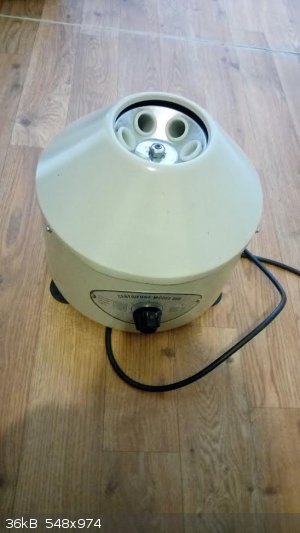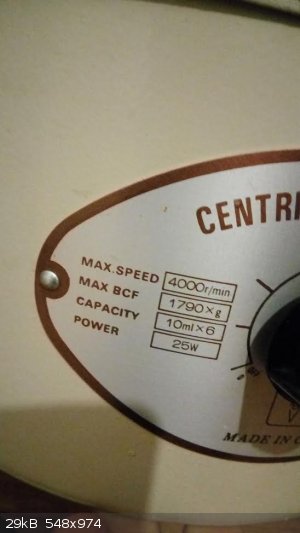tandpasta
Harmless

Posts: 30
Registered: 13-10-2014
Member Is Offline
Mood: No Mood
|
|
Special tubes for low-speed centrifuge?
I scored a free centrifuge. It was used at a physician's office for preparing urine sediment.


If I want to use glass tubes (as opposed to PP) do I need special centrifuge tubes to use this thing without breaking stuff?
Regular soda lime and borosilicate test tubes are a lot cheaper than the special centrifuge tubes.
And, what happens if you centrifuge more volume than the rated capacity?
Last question, how useful is a centrifuge with these capabilties doing stuff like breaking water/dcm emulsions, and other stuff having to do with
natural product extraction? Can it do the same as more powerful centrifuges when run for a longer period of time?
|
|
|
Tsjerk
International Hazard
    
Posts: 3032
Registered: 20-4-2005
Location: Netherlands
Member Is Offline
Mood: Mood
|
|
This is perfect for breaking emulsions. 10 minutes should be more than enough.
More volume won't fit physically.
regular glass will brake, potentially braking the centrifuge because of the sudden unbalance, or is the bottom of the pockets closed? then it
shouldn't be to bad if a tube brakes. Aluminium silicate tubes are often rated to well above 1800 g.
With any tube you should make sure it fits nicely in the bottom of the pocket, misfits will put extra force on the tubes.
|
|
|
tandpasta
Harmless

Posts: 30
Registered: 13-10-2014
Member Is Offline
Mood: No Mood
|
|
The pockets have plastic test tube holders, so a broken tube's contents won't enter the machine.
More volume will easily fit. The unit is rated at 60ml max. But the tube holders can contain a 18x100mm test tube. Assuming a 90% fill-rate and test
tube wall thickness of 0.5mm, the unit will hold 6*pi*8.5^2*90 = ~122ml.
If I'd remove the test tube holder and put the tubes in there 'naked', it would fit a lot more volume.
>regular glass will brake
So soda lime glass is out the question?
|
|
|
Tsjerk
International Hazard
    
Posts: 3032
Registered: 20-4-2005
Location: Netherlands
Member Is Offline
Mood: Mood
|
|
You could try soda lime, as 1800g is not that much, but it would be a shame if you would damage your centrifuge. Maybe you can calculate how heavy the
tube would be at 1800g and put a weight that heavy on top of the tube.
I guess if you don't go full speed and calibrate the weight properly you could fill it over 60ml. Good calibration of the opposite tubes is the key
though, if the centrifuge start to make an irregular sound, directly turn it off.
[Edited on 17-3-2017 by Tsjerk]
|
|
|
NEMO-Chemistry
International Hazard
    
Posts: 1559
Registered: 29-5-2016
Location: UK
Member Is Offline
Mood: No Mood
|
|
I use normal tubes, my centrifuge goes a bit higher than yours and I have never had an issue (I will regret saying that now!).
|
|
|
phlogiston
International Hazard
    
Posts: 1379
Registered: 26-4-2008
Location: Neon Thorium Erbium Lanthanum Neodymium Sulphur
Member Is Offline
Mood: pyrophoric
|
|
1. Yes, it can theoretically do the same as centrifuges that can reach higher g's if you run it for longer. The effect should be more or less the same
for the same amount of g*minutes (acceleration * time). Using a faster centrifuge, you reach a certain number of g*minutes faster than with a less
powerful centrifuge. However, imbalance and the specs of your tubes and rotor become increasingly critical at higher speeds.
2. If you do run it for extended periods of time, heating will occur. Friction (air, bearings, etc) will heat up the rotor and your samples. This may
or may not be problem depending on your application.
3. Filling tubes: keep in mind that the surface of the fluid will change during centrifugation. (in a fixed-angle rotor like this, it becomes
'vertical'). Don't fill the tubes too high.
4. I would advise against removing the supporting plastic inserts and putting the tubes in 'naked' as you say. They provide support for your tubes but
are also designed to contain the broken glass and your sample should your tube fail.
5. PP/PE tubes have some advantages. They are cheap. Also, because they can deform more than glass can without shattering, they will conform to the
shape of tube holders to some extent. Also, when PP fails, you usually get a rupture but not a sudden catastrophic failure (and possible imbalance)
-----
"If a rocket goes up, who cares where it comes down, that's not my concern said Wernher von Braun" - Tom Lehrer |
|
|
Rhodanide
Hazard to Others
  
Posts: 348
Registered: 23-7-2015
Location: The 80s
Member Is Offline
Mood: That retro aesthetic
|
|
Quote: Originally posted by tandpasta  | I scored a free centrifuge. It was used at a physician's office for preparing urine sediment.
If I want to use glass tubes (as opposed to PP) do I need special centrifuge tubes to use this thing without breaking stuff?
Regular soda lime and borosilicate test tubes are a lot cheaper than the special centrifuge tubes.
And, what happens if you centrifuge more volume than the rated capacity?
Last question, how useful is a centrifuge with these capabilties doing stuff like breaking water/dcm emulsions, and other stuff having to do with
natural product extraction? Can it do the same as more powerful centrifuges when run for a longer period of time? |
Nice grab!
I had access to one about a year ago, I used it a lot for breaking suspensions of Fe2O3 in water. However, my tubes were plastic, possibly HDPE of
maybe even something more resistant to chemicals. I don't know.
As well as this, it was great (This may sound stupid as s***) for separating Nitroglycerine in water suspension. Worked great and without incident...
thank ****
|
|
|